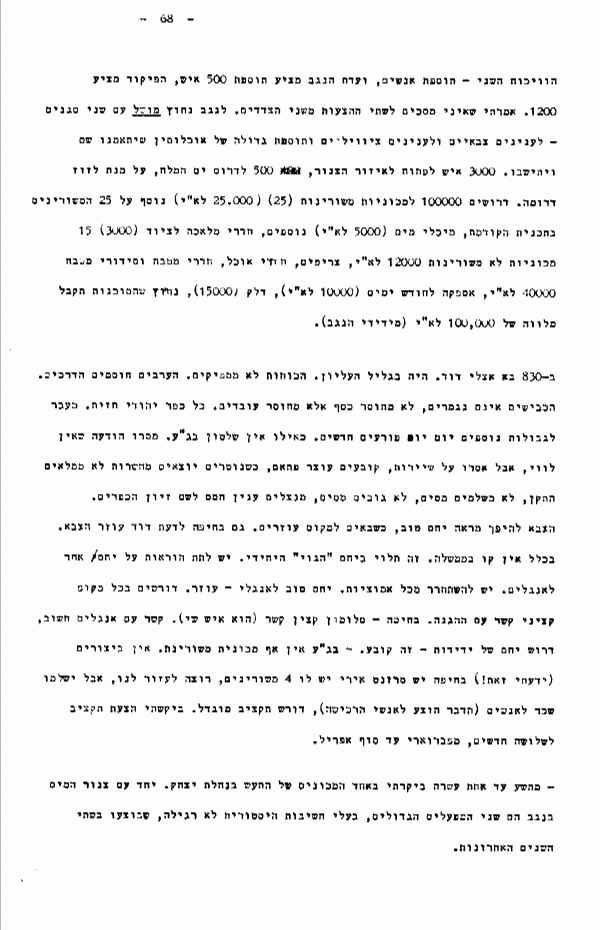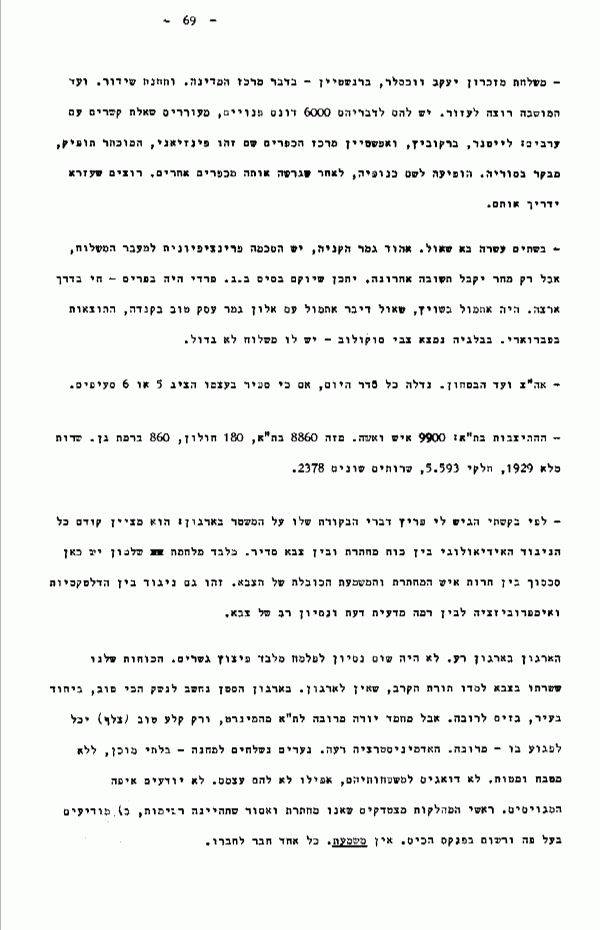[Sunday,] January 18, 1948
Sunday morning, the Negev Committee: Weitz, Kozlowski [Pinchas Sapir], Yigal P. [Allon], Yisrael [Galili], Yosef [Avidar], Shkolnik: the Command is demanding control over everything. The "Ezrahim" [HaIhud HaEzrahi] are opposed. The budget question is becoming more acute.
Weitz proposed a [military] staff of three: a commander responsible for supplies and work delegation - Amihai Kroll [sp.]; responsible for policy - Michael [Hanegbi] from Negba. Yigal proposed a staff of 7-8: as commander Nahum Sarig, chief of staff Gershon Rabinovich [sp.] from Ruhama, staff members: medical officer Dr. Padeh, [Baruch Padersky], for the technical division (construction and roads) - Oldag [sp.] [Hillel El-Dag], for agricultural production - [Mordechai] Tversky [sp.] (Tnuva), in charge of kitchens - [Rabbi Kalman] Goldreich, water [Israel] Libertovski, transportation - [Menahem] Shtosser [Hadani] [sp.], garage [workshop] - Dobkin, in charge of relations with the government - Michael [Hanegbi], relations with neighbors - David Karon [from SHAI]. Head of the supplies division - Yoss'ke [Joseph Fein] from Beit Alpha.
The second dispute - additional personnel. The Negev Committee proposes adding 500 personnel, the Command proposes 1,200. I said that I don't agree with either proposal from either side. The Negev needs a governor with two deputies - for military matters and for civilian matters, and a large increase in population who will train and settle there. At least 3,000 personnel around the pipeline, 500 for the southern Dead Sea, in order to move southward. Need 100,000 for armored vehicles (25) (P£ 25,000) in addition to the 25 armored vehicles in the previous plan, additional water containers (P£ 5000), workshop rooms for equipment (3000), 15 non-armored vehicles P£ 12,000, shacks, canteens, kitchen rooms and kitchen arrangements P£ 40,000, supplies for a month (P£ 10,000), fuel (15,000), [we] need the Agency to take a loan of P£ 100,000 (from the Friends of the Negev).
- At 8:30 David [Shaltiel] came to see me. He'd been to the Upper Galilee. The forces are insufficient. The Arabs are blocking the routes. The roads are not finished, not for lack of money but for lack of workers. Every Jewish village - is a front. Across the borders new rioters are joining daily.
There's seemingly no control in the Upper Galilee. [The British authorities] sent a message that there's no escort [i.e., they won't provide escort], but they prohibited convoys. They suddenly declared a curfew. When notrim [British-appointed guards] pull out of the service they don't fill the position. They don't pay taxes, don't collect taxes, they're exploiting the Khisas incident to arm the villages.
The army, conversely, is demonstrating a good attitude. When [they] come to a place - they help. In Haifa too, in David's opinion, the army is helping. There's no policy at all in the government. It depends on the attitude of the individual "Gentile." [We] need to issue instructions for a different attitude towards the English. Need to discard all emotions. A good attitude towards the English helps [us]. In any event [the English] are requesting Haganah liaison officers. In Haifa [Adv. Yaacov] Salomon [sp.] is a liaison officer (he's a SHAI member). Liaising with the English is important. Need an attitude of friendship - this is determinative.
In the Upper Galilee there isn't a single armored vehicle, there are no fortifications (I knew this!). In Haifa there's an Irish sergeant; he has for armored vehicles, wants to help us, if his men are paid wages (the proposal was made to the procurement personnel). [David] is demanding an increased budget. I requested a proposed budget for three months, from February through the end of April.
- From nine to eleven I visited one of the Ta'as facilities [Slavin's] in Nahalat Yitzhak. Along with the pipeline in the Negev these are the two major enterprises, of exceptional historical importance, that have carried out in the past two years.
- A delegation from Zikhron Ya'akov. Wexler and Bernstein - regarding [their proposal that Zikhron Ya'akov serve as] the state's central seat and broadcasting station. The Moshava Committee wants to help. According to them they have 6,000 available dunams.
Leitner [sp.], Berkovitch [sp.], and Epstein raised the question of relations with Arabs: the central seat of the villages is there: Sindiana. The Mukhtar Tawfiq is visiting Syria. There was a gang that turned up there after being expelled from other villages. They want Ezra [Danin] to guide them [in their relations with the Arab villages].
- At twelve Shaul [Avigur] came [from Europe]: Ehud [Avriel] has completed the purchase, there's an agreement in principle for delivery of the shipment - from Czechoslovakia by way of Yugoslavia], but he'll only receive a final answer tomorrow. It's possible that a base will be set up in Yugoslavia. Freddy [Fredkins] was in Paris. Hai [Yissacharov] is on his way to the country. Yesterday he was in Switzerland. Shaul spoke yesterday with Alon [Yehuda Arazi]. He concluded a good deal in Canada, the products [will arrive] in February. Zvi Sokolov [sp.] [i.e., Zvi Silver, one of the Ta'as and procurement personnel] is in Belgium - he has a shipment that isn't large.
- In the afternoon Defense Committee. The entire agenda was dredged up, although [Yosef] Sapir himself presented five or six items.
- In Tel Aviv 9,900 men and women reported for duty. Of these, 8,860 in Tel Aviv, 180 in Holon, 860 in Ramat Gan. Full-time service 1,929, part-time 5,593, miscellaneous services 2,378.
- Per my request Fritz [Eshet] provided me with his critique of governance in the "Organization." First of all he notes the ideological contradiction between an underground force and a regular army. Aside from a war for control there is a conflict between the liberty [sought by] an underground member and the restrictive discipline of an army. This is also a clash between dilatancy and improvisation [on the one hand] and the scientific standard, knowledge, and substantial experience of an army [on the other hand].
The training in the "Organization" is bad. The Palmach had no experience aside from blowing up bridges. Our forces who served in the army learned combat theory, which the "Organization" does not have. In the "Organization" a Sten is considered the best weapon, especially in the city. They scorn the rifle. But Muhammad fires at Tel Aviv with a rifle from a minaret and only a good sniper can hit him - with a rifle. The administration is bad. Young men are sent to a camp that isn't ready, without a kitchen or beds. There's no concern for the families, not even for themselves. They don't know where the conscripts are. The department heads justify themselves: A) because we're an underground and must not keep lists, B) [we] know [things] by heart and write [them] in a notepad. There's no discipline. Everyone is buddy-buddy. The "special company" in Sarona arranged an "attack" against some British officer, stole champagne, a radio, etc. (He suggests that I invite Major [Yohanan] Pelz, who is currently at Sarona). [In his view] the High Command of the "Organization" is not suited to its role at this time.
- In the evening Shaul [Avigur] came to see me. In the Golah [Exile, i.e., Diaspora] there's an upsurge of interest in enlisting for the country, [among] those who were and [those who] were not in the army. ETZEL is exploiting this. Nahum [Shadmi] decided to focus on this. In England - Rafi Thon [sp.] (from Maoz [Haim], of Si'ah Bet [Faction B within Mapai], son of Jacob Thon). In France Pol [Abraham Polonski] and Ross [Neta Razin] [sp.] (of Glil Yam) and Dov Benari [of Mesilot] will handle it. At the moment they're only registering, not enlisting. Nahum hopes that in March he'll be able to provide 300 trained men, in April 500. Officers, not the highest [ranking], are also reporting for duty.
A few of the young people from [the ship] Exodus [1947] remain in the camps in Germany, 800 in southern France, some (250) in the country. Most of them are in British Germany [the British military government area].
There are five vessels [ships] for 3,000 ma'apilim [clandestine immigrants]: for 1,900 from Italy, 1,100 from France. The Joint will no longer participate [in the costs of clandestine immigration] but will pay the debt. There's an arrangement between [Eliezer] Kaplan and [Joseph] Schwartz [Joint director in Europe] to acquire $1 million - a 5% increase for the Agency from reparations money (instead of 55% the Agency will receive 60%). It will be possible to bring 10,000 ] thousands of[ immigrants.
In Romania there are already difficulties exiting. The communists announced that leaving is prohibited. From Bulgaria it's possible to leave. 410 ma'apilim came from Bulgaria on the two most recent ships [the Pans]: for each immigrant $ 50 was paid to the government (for the transit [permit] - $ 20 per person).
- According to credible sources the British will leave the south on February 20. May 31 - Jerusalem and Samaria (maybe also Tulkarm). From June 1 onwards the army will be concentrated in Haifa, although it will hold onto the Galilee until the end of July.
The Tel Aviv port will not be released until the end of the Mandate.
[The following list was arranged alphabetically by the Hebrew letter with which each item begins.]
Aleph - branch, tents, airplane, opposition, training, prisoners, widows
Bet - clothing, fortifications, bottles [Molotov cocktails?]
Gimel - battalion, conscription
Dalet - housing, fuel
Heh - transport [conveyance], storage, hasbara [explanation, public relations], casualties [killed], income, expenditure
Vav - [Zionist] General Council, National Council
Zayin - flamethrowers, armament
Het - gear, brigade, garrison force, Hayish, chlorites, raw material, excavations, vocational education, chemistry
Tet - new recruit, pilot
Yud - sea, production
Kaf - roads, gangs, vehicles, village, Kofer ha-Yishuv [the Yishuv's defense fund], tools [arms], squad
Lamed -
Mem - stockpiles, food, water, [light] machine gun, police, commander, engineer, guard duty, government, apparatus [career personnel], funding, loan, fundraising campaign, salary, transmitter, [military] staff, platoon, warehouses, mines, cars
Nun - Negev, navigators, detonator, notrim [British-appointed guards], weak settlements
Samekh - boats, patrol, ship
''Ayin - Arabs, press
Peh - compensation/reparations, casualties [wounded], Palmach, [military] company, steel
Tzadi - equipment, tires, army, barracks
Kuf - purchases, officer, fund
Resh - procurement, rifles, radio, healthcare
Shin - SHAI, armoring, broadcasting, services, sandbags, wages
Taf - reinforcement, barbed wire, Ta'as [home manufacture of weapons], [air] flight, [military] response, propaganda, budget, working conditions













